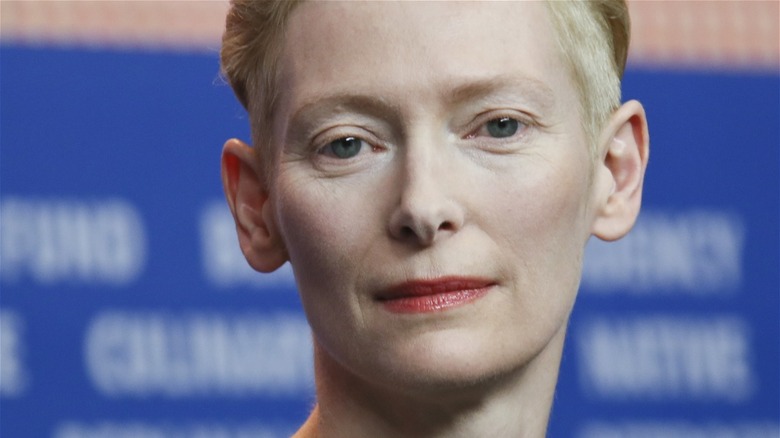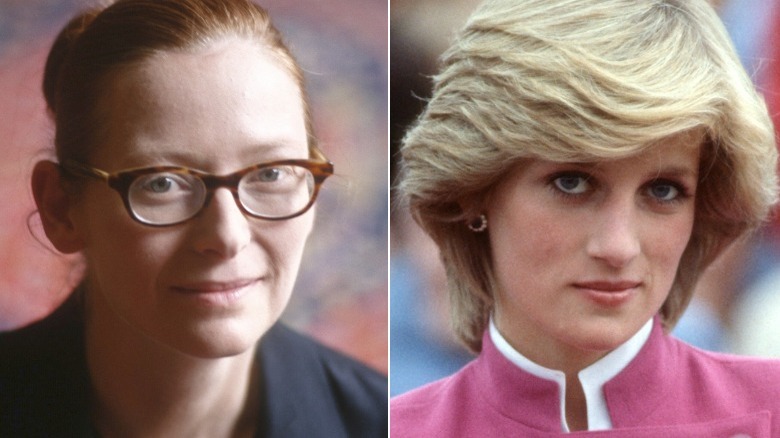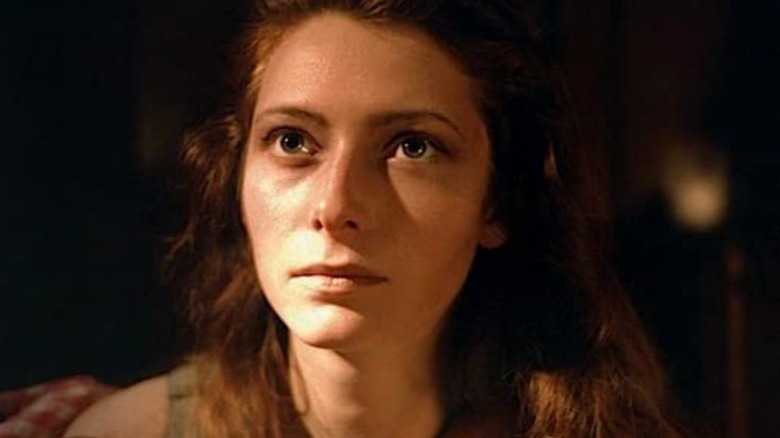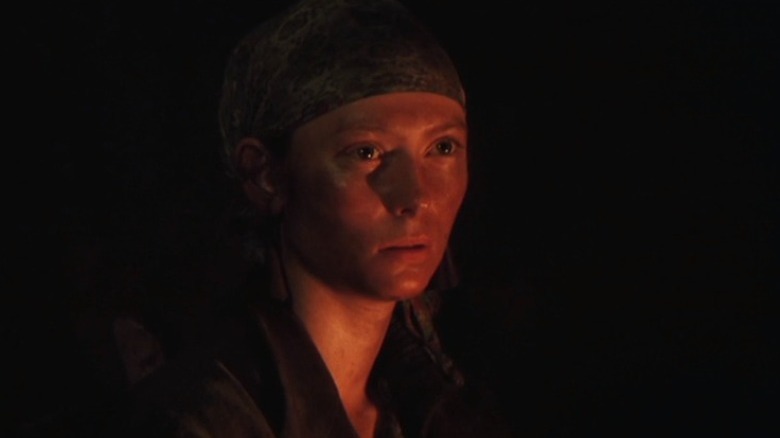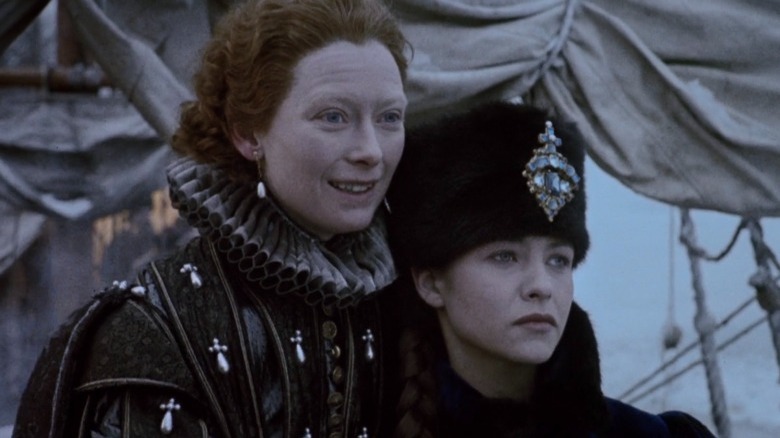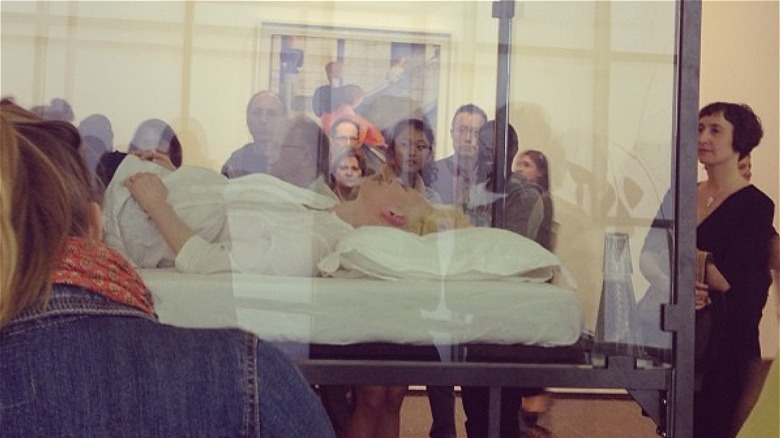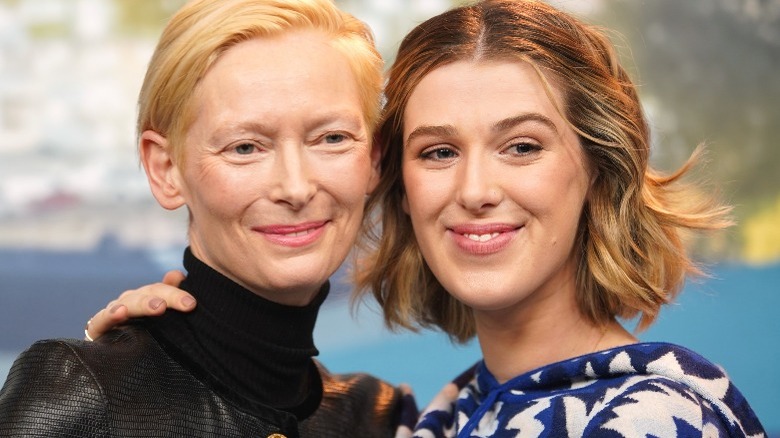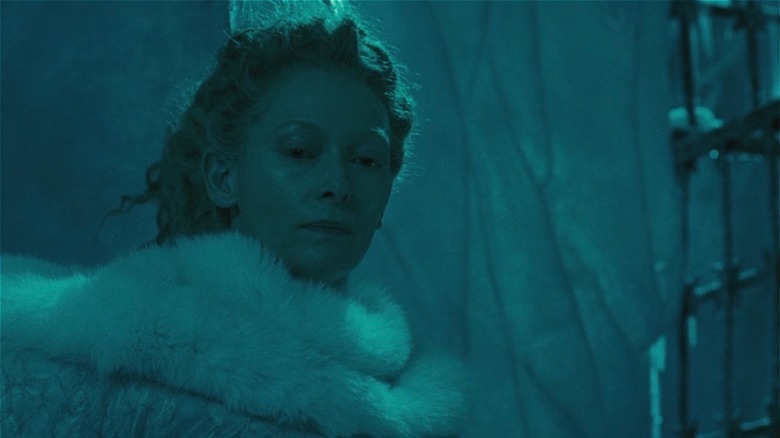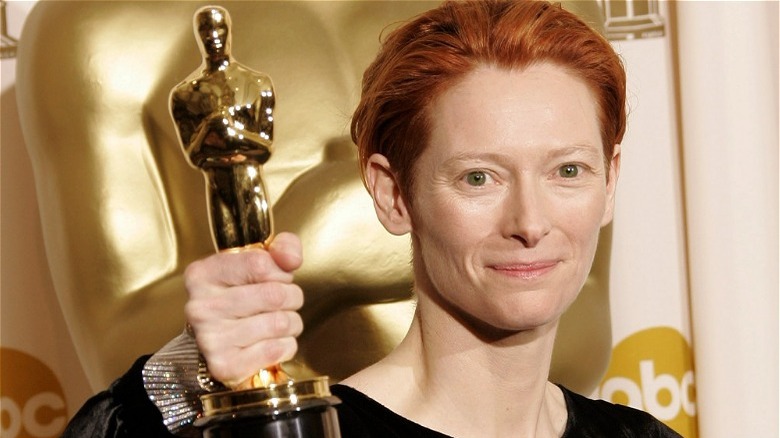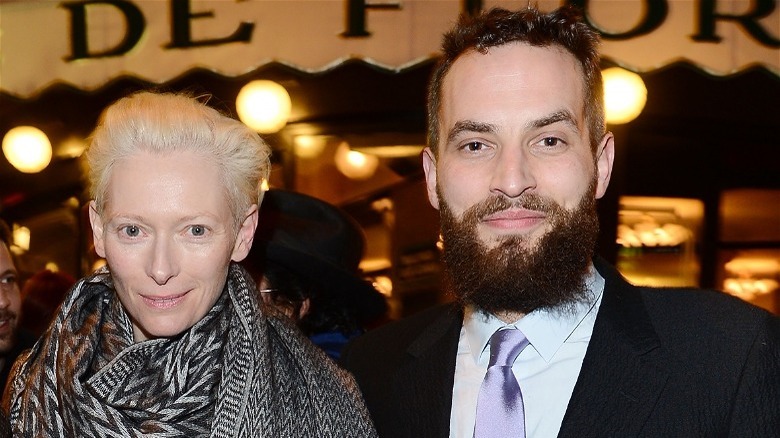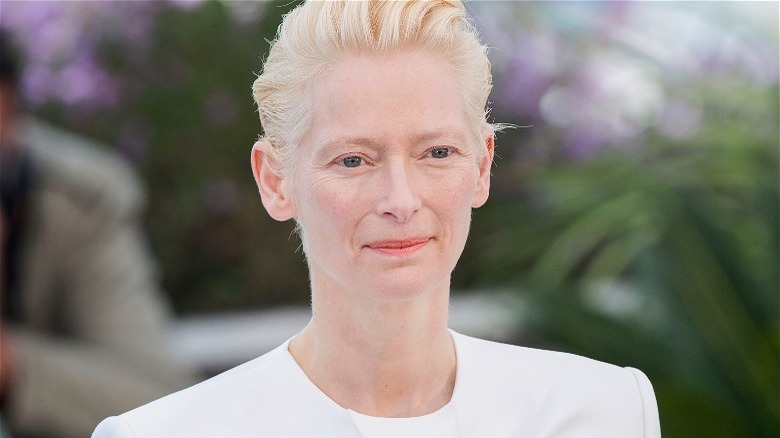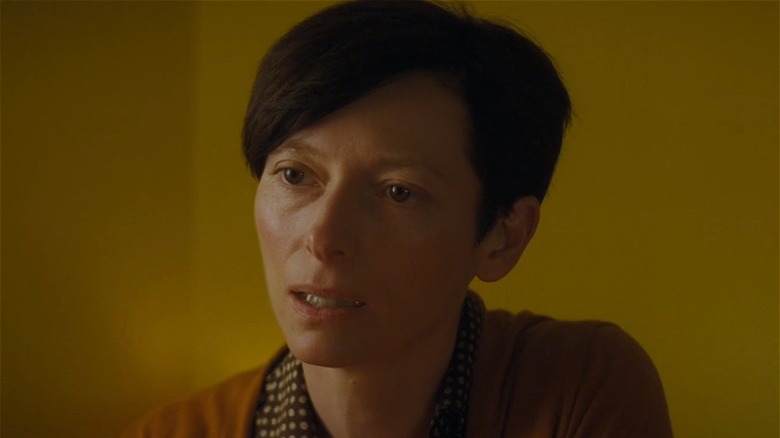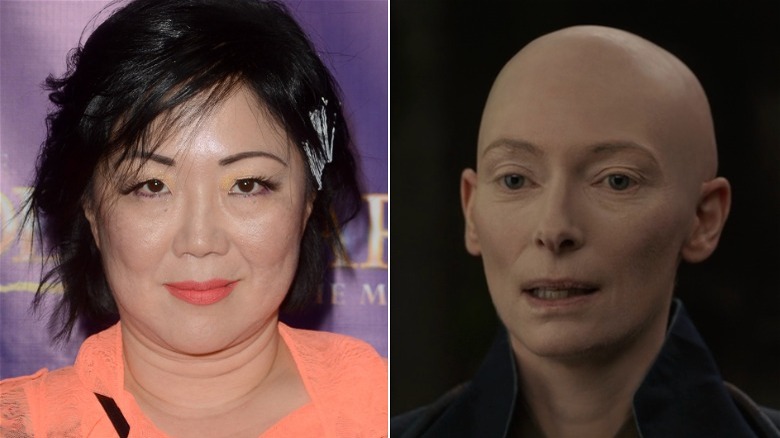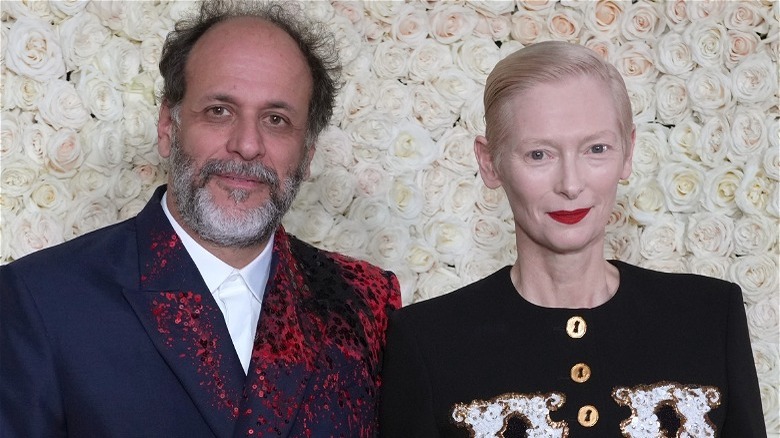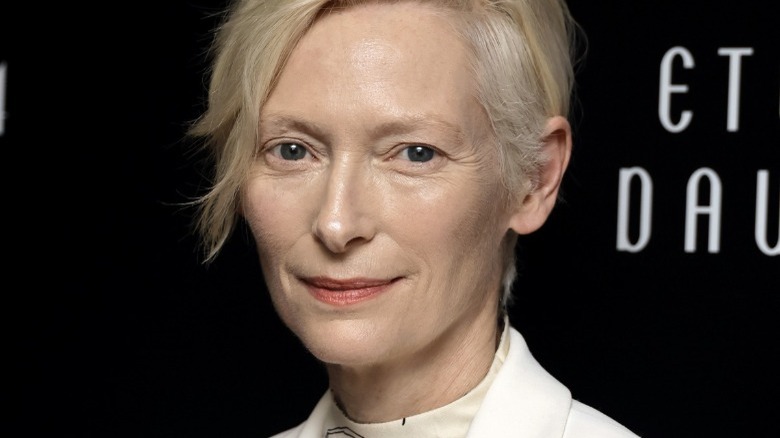How Tilda Swinton Became A Hollywood Star
We may receive a commission on purchases made from links.
Nowadays, Tilda Swinton is world-famous as a major star in Hollywood. She's able to move seamlessly between high-budget blockbuster hits like "Avengers: Endgame" and smaller, more arthouse films like Wes Anderson's "The French Dispatch." She's also extremely prolific, usually starring in numerous films each year. However, each new role is a challenge for the star. She frequently claims that she doesn't consider herself an actor and that she doesn't know anything about the profession, even though she's received accolades like an Academy Award. Swinton often plans to quit entirely. "I never intend to be in another film, and then someone asks me to be, or we dream up some idea together, and I say, 'Okay, this will be the last one,'" she told Backstage. "And it seems to go on and on."
One way Swinton avoids disappointment in her career, she claims, is by not expecting or wanting any particular outcome. "I've never had any ambition as an artist," she insisted to Vogue. "That may sound crazy and transgressive, but it's a fact." Even if we are to take her at her word, her path to the top of Hollywood has been a long one, with many twists, turns, and heartbreaks along the way. Read on to learn how Tilda Swinton became a Hollywood star ... ambition or not.
She had a privileged upbringing ... with a dark side
Tilda Swinton was born Katherine Matilda Swinton in 1960. According to The Guardian, she was raised by an influential Scottish family; her grandmother, Mrs. George Swinton, was even painted by John Singer Sargent. Her father was Major General Sir John Swinton, Laird of Kimmerghame House, according to The Peerage. However, Tilda felt like she didn't fit in. "I grew up in a family where I felt like a changeling," she told Vogue, always aware that something about her was different.
When she was young, her parents planned a move to Germany, so Tilda was sent to a boarding school called West Heath Girls' School. "I didn't like being clever — I was bullied for it," she told The Guardian. In another interview with the newspaper, she recalled, "I don't think I spoke for five years." However, there was one bright spot, a friendship with a classmate named Diana Spencer, who would grow up to become Princess Diana. "It was a holding bay," Tilda remembered of the expectation that many of the young girls would grow up to marry into the aristocracy. "We managed to survive," she added. "Most of us."
Her time at Cambridge was difficult
Tilda Swinton went to Cambridge, planning to study poetry, but she found that once she got to the university, she was no longer able to write. "It was terrible," she told Vogue, decades later. "I'm still kind of traumatized by it." This time in her life is something Swinton returns to often in interviews, describing her university years as a period of intense self-reflection. "I was supposed to go for one thing and dropped the ball immediately. There is a real dark shame attached to it," she told The Irish Times. "I was embarrassed about my lack of ambition."
However, quitting her planned poetry major freed up Swinton's schedule for her to discover a love of something new: performing. At first, she acted in the theater, although she claims she never considered herself an actor in the way that her peers did. "At university the first people I met who wanted to be actors were very serious about it," she recalled to The Irish Times. "They were focused and professional, very clear about taking part in a tradition and a profession. I was very aware I was not like that."
After leaving Cambridge, Swinton joined the Royal Shakespeare Company, though she had her eye on a different part of the acting profession: film. She recalled to Backstage, "I worked in the theater for a year and a half and was in the process of not enjoying it all when I met Derek." The meeting would change her life.
A partnership with Derek Jarman informed her life
After spending much of her 20s trying to figure out which aspect of performing she enjoyed most, Tilda Swinton had a fateful meeting with a man who would become one of her closest friends and collaborators. Queer filmmaker Derek Jarman was looking for actors to play roles in his film "Caravaggio," a biopic about the transgressive painter, and he and Swinton became enamored with one another. "I met Derek and I met practicing artists for the first time," she later told The Guardian. "I think he was almost the first living artist I'd ever met."
Jarman developed a sort of artists collective, a group of young performers and filmmakers who worked and played together. For Swinton, it was exactly the sort of relationship she didn't know she'd been looking for. "I always felt I was queer — I was just looking for my queer circus, and I found it. And having found it, it's my world," she reflected to Vogue.
Swinton and Jarman would make seven films together, including "War Requiem" and "The Garden." Unfortunately, Jarman passed away in 1994 of AIDS, leaving Swinton adrift. That was a particularly tough year for her, as the AIDS epidemic was in full swing. "Derek died in 1994 and that year I went to 43 funerals, all AIDS-related deaths," she told The Guardian. Her grandmother compared the decimation of the queer community to the world wars she'd lived through. "She said: 'This is your generation's war.'"
Her gender-bending in Orlando was a breakout moment
One of Tilda Swinton's first breakout roles — outside of the Derek Jarman ecosystem — was in director Sally Potter's movie "Orlando," based on the Virginia Woolf novel of the same name. In a role that would signal much gender- and sexuality-bending to come, Swinton plays a gender-fluid soul in various incarnations across bodies and centuries, morphing from an Elizabethan nobleman, to a female ambassador during the Ottoman Empire, and more.
Swinton later told Metrograph that the film came together thanks to a series of photographs taken at the country house that inspired the novel. Knowing that they had an upward battle in convincing investors to help make the movie, Potter dressed the actor in a period costume and went to the house anyway, where she posed for photos that would convey the aesthetic approach they hoped to take with the film. She described the experience of watching the film back decades later, recalling, "What I saw was something hypnotically beautiful in terms of its imagery, not only the shots and the impact of its soundtrack, but also, its environment: an abundance of flowers, velvets, brocade, jewels, gilded furniture, all the paraphernalia of the aristocratic landscape."
The film was a critical success; it currently has an 82% Fresh rating on Rotten Tomatoes, and it helped launch Swinton's career to international audiences who saw it at Sundance (via Slate).
Tilda Swinton, performance artist
Reeling from the death of her collaborator Derek Jarman, Tilda Swinton re-examined her future. "When Derek died in 1994, I was at a crossroads, not really knowing how to work without him," she later told Backstage. "I wasn't sure if I was going to be working as a performer at all." Instead, for a time, she made a pivot into art. In 1995, along with Cornelia Parker, Swinton conceived a performance art installation where she spent a week inside a glass box in an art gallery and invited people to come see her. She called it The Maybe, explaining to AnOther Mag years later that she wanted a "gesture" that would bring together the concept of screen performance and physical space. In other words, she wanted everyone to share the experience of examining her face while she slept, just as actors in films can't look back at the observer.
Not everyone was a fan of the performance. In fact, a critic in The Evening Standard (via The New Republic) called it "a feeble and utterly self-indulgent performance by two inadequately educated women." Not content to stop there, he wondered, "Are women capable of coherent thought?" Yikes.
She resurrected the piece in 2013, according to The New York Times. This time, she slept in the Museum of Modern Art in New York, and she did not announce a schedule in advance.
She's the mother of twins
In 1997, Tilda Swinton entered a new phase of her transformation when she became a mother to twins, Honor and Xavier Swinton Byrne. She later told The Guardian that she felt very lucky, because she likes her kids. "I remember noticing, when I had my babies, how much I liked them, and not just loved them, but I was really into them," she said. "I knew I was going to be curious about them, and up for the mayhem ahead. But at the same time I remember noticing I was relieved this thing was present in me. And I hadn't realized there might be a doubt."
The twins' father is artist and playwright John Byrne, and together the two tried to bring up their children with an appreciation for the arts. "I marvel at what it must be like for my children," she told Vogue. "They're surrounded by art. Our house is hung with the paintings of their father, their stepfather; they watch films by their friends; they read books by their godparents. I mean, for me, this is the biggest luxury I can imagine."
It seems their upbringing paid off. Her daughter is an actor, too, starring with her mother in both "The Souvenir" and "The Souvenir, Part II." However, Swinton told Vogue that, despite the critical success of those films, Honor doesn't have further aspirations. "My daughter is now a psychology and neurology student in Edinburgh," she revealed.
Breaking into Hollywood
Though she got her start in British arthouse cinema, in the early 2000s, Tilda Swinton made a move toward more mainstream productions. At first, she had roles in films like "Vanilla Sky" with Tom Cruise and "The Beach" with Leonardo DiCaprio. In 2005, though, she starred in two films that broke her out to wider audiences outside the U.K.. First, in "Constantine," she played the archangel Gabriel opposite Keanu Reeves. Then, she starred as the White Witch in "The Chronicles of Narnia: The Lion, The Witch, and The Wardrobe."
Though the latter film is an adaptation of a classic work of literature, Swinton gave some input into how her character should be portrayed on screen. Recognizing that the original story was about children fleeing London during World War II, she suggested that the White Witch should appear more like a white supremacist. "I thought it was extremely irresponsible to make her look less than the ultimate supremacist, which is what she is," Swinton explained to MovieWeb. "Make her as Aryan as possible. Apart from being a fantasy film, it's also a historical film."
Swinton seems to have enjoyed her first experiences dipping her toe into mainstream acting, though she insisted it wasn't about viewership. "I'm very lazy about people seeing my work," she told Dark Horizons. "I'm an arrogant believer in the power of films to find itself an audience."
She won an Oscar for Michael Clayton
In 2007, Tilda Swinton starred in director Tony Gilroy's film "Michael Clayton." She played Karen Crowder, a lawyer, and she told Girl.com.au that she felt like a tourist stopping by a Hollywood studio production. However, as is a theme throughout her career, her collaborators drew her into the project. "When those people who are asking you to go and check in for a while are people like Tony Gilroy and George Clooney, it's really a pleasure because they're such conscientious filmmakers, they know the genre they're dealing with, and they know the market they're dealing with. They're sophisticated enough to play with it but they're also classical enough to want to celebrate it," she explained.
Swinton's performance received critical raves, and she won a number of awards for the role, including an Oscar for Best Supporting Actress. She used her acceptance speech to give Clooney a shoutout, teasing her co-star about his dedication to his art. "Seeing you climb into that rubber Batsuit, from 'Batman and Robin,' the one with the nipples, every morning under your costume ... on the set, off the set, hanging upside down at lunch ... You rock, man!" she joked.
Tilda Swinton, Hollywood star, had arrived. "I'm happy to be a movie star," she told The Scotsman. "The downside of being an arthouse freak is that it's a kind of elitist sport. I really like people waving at me in airports."
Tilda Swinton, tabloid fixture
After she won the Oscar, there was suddenly more interest in Tilda Swinton's personal life. Tabloids in the late 2000s reported that the "Burn After Reading" star was still with John Byrne, the father of her children, but that she also seemed to be dating Sandro Kopp, a young artist who was 39 years younger than Byrne. Furthermore, Live News (via Stuff) reported that Byrne himself had someone on the side, too; he was also dating Jeanine Davis. "We have not hidden away and Jeanine is very much part of my life," Byrne told the outlet. "Tilda knows all about it and is more than happy with the situation. Tilda has Sandro and the arrangement works very well."
The unconventional arrangement was a source of fascination for fans just learning about Swinton's life, and they became the subject of numerous thinkpieces about the concept of open marriages. Harper's Bazaar, for example, wrote that Swinton responded to all the hubbub. "We are all a family. What you must also know is that we are all very happy," she stated matter-of-factly.
Tilda's film festival of dreams
It should come as no surprise that Tilda Swinton loves movies. It should also not be controversial to say that Swinton is a bit eccentric, as well. The perfect marriage of those two qualities is the traveling film festival she's put on in her native Scotland since 2008. Called the Ballerina Ballroom Cinema of Dreams, the film festival takes place in a building that has been everything from a concert hall to a bingo space, according to the film festival's official website.
Digital Spy reported that Swinton announced she wanted her festival to "reinject some romance into the film festival circuit." To that end, she took it on the road ... literally. In a traveling roadshow edition of the Cinema of Dreams, Swinton literally pulled a screen around Scotland. Admission cost merely a dish of food to share, and Swinton wrote (via RogerEbert.com) that she hoped festivalgoers would "become a Fellow Traveller. Don a kilt and boots and bring a cheese sandwich and a tent, and walk this place of mountain streams and movie dreams in person." Sign. Us. Up.
We Need to Talk About Kevin made her reflect on motherhood
As the new decade dawned following Tilda Swinton's Oscar win, she refocused her career on independent films. She starred in Lynne Ramsey's searing thriller "We Need to Talk About Kevin," playing the mother of a boy who seems to have been born evil and who goes on to commit a mass murder at his school. Kevin gives his mother trouble throughout his life, from his early years stricken with colic to later years characterized by defecation and masturbation at inappropriate times.
Playing the role sparked a lot of thoughts for Swinton about the nature of motherhood and questions of evil. "Whenever there are children killing children, or perpetrating great acts of violence, there's always this word 'evil' pulled out of the top drawer," she pondered to The Guardian. "Isn't that the triumph of civilization? That we manage not to be monstrous?" Speaking with Vulture, she added that the film wasn't necessarily interested in whether Kevin is truly "evil," or whether Swinton's character is responsible for her son's actions. "I don't think it is about her being responsible; it's about her fear that she is responsible. It's a crucial difference," she said.
Swinton's performance was well-received. Among other accolades, according to IMDb, she was nominated for a BAFTA for her role.
She controversially played The Ancient One
Tilda Swinton joined the cast of 2016's "Doctor Strange," a Marvel movie. In the film, Swinton plays The Ancient One, a part originally written in the comics as a Tibetan man. The version of the character in the movie, however, is a Celtic mystic ... perhaps more fitting for the Scottish Swinton. Swinton's acceptance of the role was not without controversy — one of Swinton's biggest public missteps. On an episode of Bobby Lee's podcast "Tiger Belly," comedian Margaret Cho related an incident where Swinton had reached out to her for clarification about why people were upset about her casting. "It was a long fight about why the part should not have gone to her," Cho claimed. "It was weird because I felt like a house Asian, like I'm her servant."
In response, Swinton released the unedited email transcripts to a number of outlets, including Jezebel. The full conversation seems to show Cho being receptive to Swinton's questions, mischaracterizing Swinton's approach. For example, Cho made it sound like Swinton defensively brought up a project she was working on with a Korean director (Bong Joon Ho), but it was Cho herself who asked Swinton about producing projects featuring Asian voices.
Years later, Swinton told Variety that the conversation was important and that she has no hard feelings. "I made a questionable decision to reach out to somebody in a certain way, which was naïve and clearly confusing," she admitted.
Your favorite director's favorite actor
"If I fall into a relationship with someone and we start to make films together, it very often goes on for a very long time," Tilda Swinton told People while attending a gala at the Academy Museum in recognition of her work. "It's always been the same thing from the beginning. It's the conversation with the filmmakers."
At this point in her career, Swinton is your favorite director's favorite actor. She's collaborated with some of the biggest names in cinema, including making five movies with Wes Anderson, four with Luca Guadagnino, four with Jim Jarmusch, three with Joanna Hogg, and two with Bong Joon Ho, the Coen Brothers, and David Fincher. That's not to mention her work with luminaries such as Guillermo del Toro, Apichatpong Weerasethakul, and Pedro Almodovar, among many, many others.
Jarmusch, who directed her in films such as "Only Lovers Left Alive," told Vanity Fair that he finds Swinton fascinating. "She is a remarkable creature, and, I've said this before, but I wish we had a matriarchal system and Tilda was our leader. I would do whatever she said," he insisted. "Bones and All" director Guadagnino, responsible for Swinton-led films like "I Am Love" and "Suspiria," has a different take. "Tilda is a filmmaker, not just an actress," he told ScreenDaily. "She has a great knowledge of the machine of the making of a movie and this is very profound."
Tilda Swinton in the pandemic
In 2022, Tilda Swinton revealed to The Guardian that she has Long COVID symptoms. "I was coughing like an old gentleman who smoked a pipe for 70 years, and had nasty vertigo," she said, describing an incident where she was bed-bound for several weeks. She added, "I got off relatively lightly, but the worst thing is how it affected my brain." While Swinton said she is typically good with memorizing lines, she now finds herself struggling to get the words out. "This was like chewing a really big piece of gum," she said.
Nevertheless, Swinton has released a staggering number of films since the COVID-19 pandemic began. She starred in George Miller's "Three Thousand Years of Longing," Joanna Hogg's "The Souvenir Part II" and "The Eternal Daughter," Apichatpong Weerasethakul's "Memoria," Wes Anderson's "The French Dispatch," Pedro Almodovar's "The Human Voice," and many more.
The star told Vogue that she was intrigued by the creative possibilities required by COVID-limited productions, and she suggested that her background in arthouse filmmaking made her uniquely suited to meeting the moment. "Necessity is the mother of invention," she reflected. "It's funny, because I realize how very well-suited those of us who grew up through the underground are to this kind of attrition, because that's what we know. That feeling of making lemonade whenever you can. And there's a part of me, as a practitioner, that's exhilarated by it."

